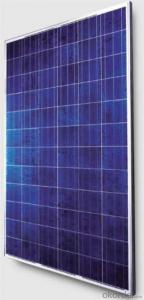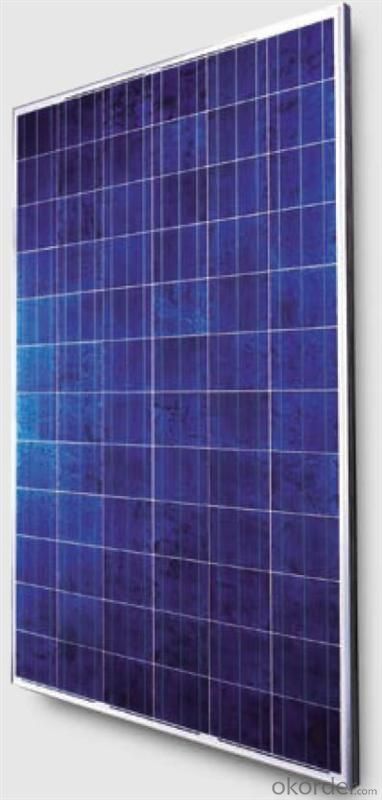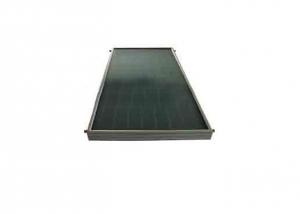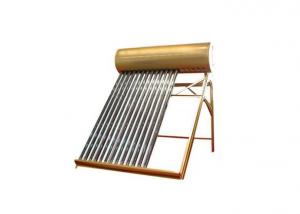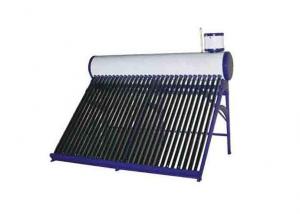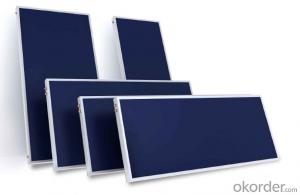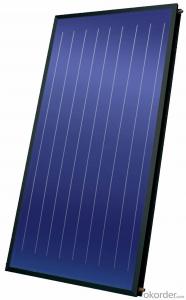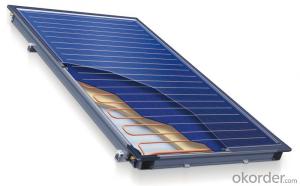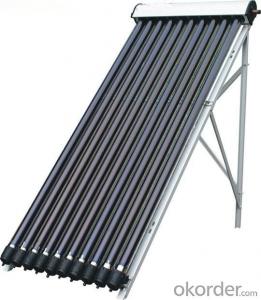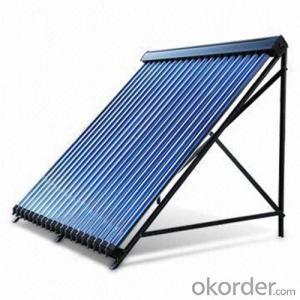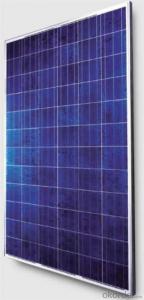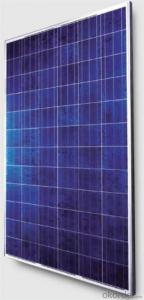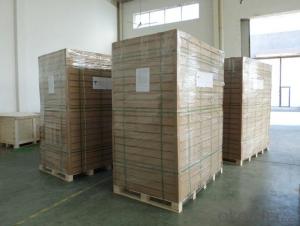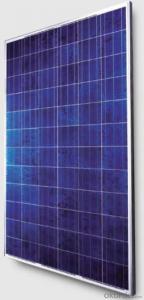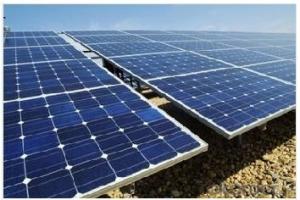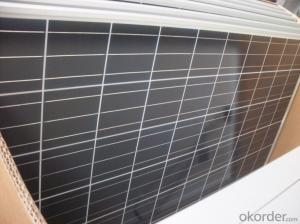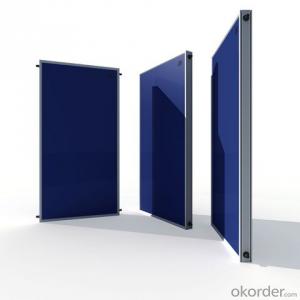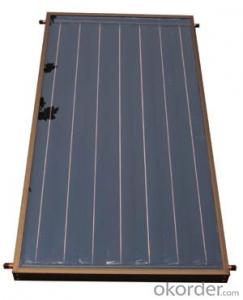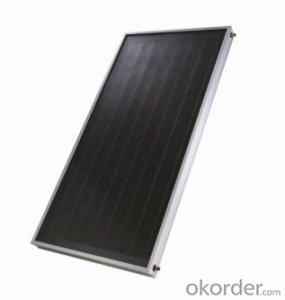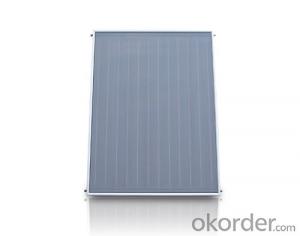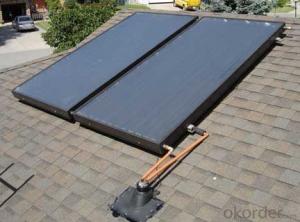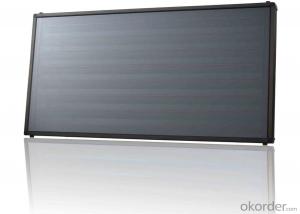CNBM Brand PV Silicon Modules - Solar Collectors Iswin Made in China
- Loading Port:
- Tianjin
- Payment Terms:
- TT OR LC
- Min Order Qty:
- 1 pallet
- Supply Capability:
- 100000000 pallet/month
OKorder Service Pledge
OKorder Financial Service
You Might Also Like
Solar panel refers either to a photovoltaic (PV) module, a solar hot water panel, or to a set of solar photovoltaic modules electrically connected and mounted on a supporting structure. A PV module is a packaged, connected assembly of solar cells. Solar panels can be used as a component of a larger photovoltaic system to generate and supply electricity in commercial and residential applications. Each module is rated by its DC output power under standard test conditions, and typically ranges from 100 to 320 watts. The efficiency of a module determines the area of a module given the same rated output – an 8% efficient 230 watt module will have twice the area of a 16% efficient 230 watt module. There are a few solar panels available that are exceeding 19% efficiency. A single solar module can produce only a limited amount of power; most installations contain multiple modules. A photovoltaic system typically includes a panel or an array of solar modules, an inverter, and sometimes a battery and/or solar tracker and interconnection wiring.
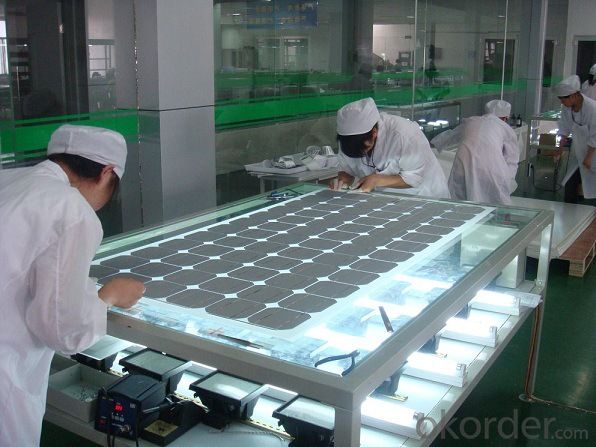
Specifications:
solar panels from 5W--300W, made of TAIWAN MOTECH brand cells,with CO in TAIWAN,Mono and Poly with VDE,IEC,CSA,UL,CE,ISO.
We import solar cells from Taiwan Motech brand, with this CO in taiwan and our CSA certification,we can still sell goods to Anti-dumping areas like USA. Our main products are solar panels, off grid and on grid solar home systems , solar street lighting systems, solar water heating system,solar pump,solar attic fan, solar DC LED lights and solar DC refrigerators.
Certificates : ISO, CE, VDE IEC, MCS, CSA-UL, CEC.
Delivery time: sample 10days, order 25-30days.
Sample: charged.
Payment term: T/T 30% as deposit, 70% before shipment. Or irrevocable L/C at sight.
Trade term: FOB Shenzhen or CIF destination seaport or Airport.
Characteristics:
I.Solar Cell : High efficiency crystalline solar cell. Even if under the weak light, the solar module can produce maximum power output.
II.Tempered glass (toughened glass): Anti-reflecting coating and high transmission rate glass increase the power output and mechanical strength of solar module.
III.EVA and TPT: Using high quality EVA and TPT to prevent destroying and water.
IV.AI frame: Without screw, corner connection. 6 holes on the frame can be installed easily.
V.Junction box: Multi function junction box with water proof.
VI.Long lifetime: ≥25 years; Less power decrease.
VII.Good performance of preventing from atrocious weather such as wind and hails.
VIII.Resisting moisture and etching effectively, not effected by geology.
IX.The certificate issued by international authority: UL, TUV, IEC, VDE, CE.
Quality and Safety
1. Rigorous quality control meets the highest international standards.
2. High-transmissivity low-iron tempered glass, strong aluminium frame.
3. Using UV-resistant silicon.
4. IS09001/14001/CE/TUV/UL
Warranties
1. 10 years limited product warranty
2. 15 years at 90% of the minimal rated power output
3. 25 years at 80% of the minimal rated power output
Technical date :
ITEM NO.: | Poly 156*156 cell ,60pcs . Power range from 230Wp-260Wp | ||||||
Maximum Power(W) | 230 | 235 | 240 | 245 | 250 | 255 | 260 |
Optimum Power Voltage(Vmp) | 29.4 | 29.5 | 29.7 | 30.1 | 30.3 | 30.5 | 30.7 |
Optimum Operatige Current(Imp) | 7.83 | 7.97 | 8.08 | 8.14 | 8.25 | 8.37 | 8.48 |
Open Circuit Voltage(Voc) | 36.7 | 36.8 | 36.9 | 37.1 | 37.3 | 37.5 | 37.7 |
Short Circuit Current(Isc) | 8.52 | 8.59 | 8.62 | 8.65 | 8.69 | 8.73 | 8.78 |
Solar Cell: | 156*156 Poly | ||||||
Number of Cell(pcs) | 6*10 | ||||||
Name of Solar Cells | Polycrystalline Cell | ||||||
Size of Module(mm) | 1650*992*40/45/50 | ||||||
Cable & Connector Type | Pass the TUV Certificate | ||||||
Frame(Material Corners,etc.) | Aluminium-alloy | ||||||
Back sheet | TPT | ||||||
Weight Per Piece(KG) | 19.5KG | ||||||
FF (%) | 70-76% | ||||||
Junction Box Type | Pass the TUV Certificate | ||||||
Tolerance Wattage(e.g.+/-5%) | ±3%, or 0-3% | ||||||
Front Glass Thickness(mm) | 3.2 | ||||||
Temperature Coefficients of Isc(%) | +0.04 | ||||||
Temperature Coefficients of Voc(%) | -0.38 | ||||||
Temperature Coefficients of Pm(%) | -0.47 | ||||||
Temperature Coefficients of Im(%) | +0.04 | ||||||
Temperature Coefficients of Vm(%) | -0.38 | ||||||
Temperature Range | -40°C to +85°C | ||||||
Surface Maximum Load Capacity | 5400Pa | ||||||
Allowable Hail Load | 23m/s ,7.53g | ||||||
Bypass Diode Rating(A) | 12 | ||||||
Warranty | 90% of 10 years, 80% of 25 years. | ||||||
Standard Test Conditions | AM1.5 1000W/ 25 +/-2°C | ||||||
Packing | carton or pallet | ||||||
1*20' | 14 Pallets / 316pcs | ||||||
1*40'STD | 25 Pallets / 700pcs | ||||||
FAQ:
I..Will you focus on the safety of the goods during transportation?
Yes, Safety of the cargo is the primary element that we would consider on transportation.
II..How would guarantee the quality will meet the requirements of your clients?
Before shipment, we will have inspection for each batch of goods.
III..What certificates do you have?
IEC,UL,TUV,CSA,etc.
IV..Can you do OEM according to clients’ requirements?
Yes, we have our own brand while we can provide OEM service.
- Q: Can solar collectors be used for heating water for educational institutions?
- Yes, solar collectors can definitely be used for heating water in educational institutions. Solar water heaters are a sustainable and cost-effective solution for meeting the hot water demands of schools, colleges, and universities. These institutions often have a high requirement for hot water due to the presence of numerous students and faculty members. Solar collectors, also known as solar thermal panels, capture energy from the sun and convert it into heat. This heat can then be used to warm water for various purposes, such as showers, kitchen use, and heating systems. By utilizing solar collectors, educational institutions can significantly reduce their reliance on traditional energy sources like electricity or gas, thereby decreasing their carbon footprint and contributing to a greener environment. The installation of solar water heating systems can provide numerous benefits for educational institutions. Firstly, it allows them to save on their energy bills as the sun's energy is free. This cost savings can be redirected towards other educational programs or facility improvements. Additionally, utilizing solar energy aligns with the educational institutions' commitment to sustainability and can serve as an educational tool for students to learn about renewable energy and environmental conservation. Solar water heating systems are versatile and can be designed to meet the specific hot water demands of educational institutions. The size and number of solar collectors can be customized based on the institution's requirements, ensuring an adequate supply of hot water throughout the year. Furthermore, solar water heating systems are reliable and require minimal maintenance. With proper installation and routine check-ups, these systems can have a long lifespan, ensuring a consistent supply of hot water for educational institutions for many years. In conclusion, solar collectors are an excellent choice for heating water in educational institutions. They offer cost savings, contribute to sustainability efforts, and provide educational opportunities for students. By harnessing the power of the sun, educational institutions can meet their hot water demands while reducing their environmental impact.
- Q: Can solar collectors be used for charging batteries?
- Solar collectors have the capability to charge batteries. These collectors, also referred to as solar panels or photovoltaic (PV) panels, transform sunlight into electricity using the photovoltaic effect. The resulting electricity can be utilized to charge batteries, either directly or indirectly. Direct battery charging with solar collectors entails connecting the panels directly to the battery via a charge controller. The charge controller regulates the amount of electricity entering the battery, ensuring safe and efficient charging. This technique is commonly employed in small-scale applications such as solar-powered battery banks, solar-powered lighting systems, or solar-powered portable devices. Indirect battery charging with solar collectors involves converting solar electricity into alternating current (AC) using an inverter. The AC electricity can then power devices or appliances, including battery chargers. In this case, the battery charger is connected to the AC output of the inverter, which charges the batteries using the electricity generated by the solar panels. This approach is frequently utilized in larger-scale applications like residential or commercial solar power systems. In summary, solar collectors offer an exceptional renewable energy source for battery charging. They offer a clean and sustainable method of generating electricity, thereby reducing dependence on traditional energy sources. Whether in small-scale or large-scale applications, solar collectors can effectively charge batteries and contribute to a more eco-friendly and sustainable future.
- Q: How often do solar collectors need maintenance?
- Solar collectors generally require minimal maintenance. However, it is recommended to have them inspected and cleaned annually by a professional to ensure optimal performance and longevity.
- Q: Can solar collectors be used for heating in tropical regions?
- Yes, solar collectors can indeed be used for heating in tropical regions. Despite the abundance of sunlight in these regions, solar collectors can still effectively harness solar energy to provide heating for various purposes such as water heating, space heating, or even air conditioning. The use of solar collectors in tropical regions can contribute to energy efficiency, reduce reliance on fossil fuels, and lower greenhouse gas emissions.
- Q: Are solar collectors suitable for heating restaurants?
- Yes, solar collectors can be suitable for heating restaurants. Solar thermal systems can effectively capture and convert sunlight into heat energy, which can be used for heating water or air in a restaurant. These systems can be designed to meet the specific heating demands of a restaurant, providing sustainable and cost-effective heating solutions.
- Q: How do solar collectors affect noise pollution?
- Solar collectors do not add to noise pollution because they do not generate any sound when in operation. Unlike traditional energy sources like fossil fuel power plants or wind turbines, solar collectors do not need any moving parts to produce electricity. This implies that there are no mechanical elements, such as turbines or engines, that can cause noise. Consequently, solar collectors have no effect on noise pollution and are regarded as a quiet and environmentally-friendly energy solution.
- Q: Can solar collectors be used in combination with radiant floor heating systems?
- Solar collectors can indeed be used alongside radiant floor heating systems, and this combination proves to be highly effective in offering sustainable and efficient heating solutions for buildings. The utilization of solar collectors, such as solar thermal panels or evacuated tube collectors, enables the sun's energy to warm a fluid, typically water or a water-antifreeze mix. This heated fluid is then circulated through a network of pipes embedded in the floors, thus providing radiant heat to the occupied space. The integration of solar collectors with radiant floor heating presents the advantage of employing renewable and environmentally friendly energy sources for space heating. By tapping into the sun's power, the dependence on fossil fuels or electricity is reduced, leading to decreased energy expenses and carbon emissions. Furthermore, solar collectors can fulfill a significant portion of the heating requirements, particularly during sunny seasons, thereby further diminishing the necessity for conventional heating systems. However, it is crucial to bear in mind that the effectiveness of this combination is contingent upon various factors, such as the climate, availability of solar resources, and system design. In areas with limited exposure to sunlight, the solar collectors may not be capable of generating sufficient heat for the radiant floor system, necessitating the utilization of an auxiliary heating source. Thus, it is imperative to conduct a comprehensive assessment of the specific conditions and demands of the building to ascertain the feasibility and optimal design of the solar collector and radiant floor heating system integration.
- Q: Can solar collectors be used for heating fitness centers?
- Yes, solar collectors can be used for heating fitness centers. Solar thermal systems can efficiently capture and convert sunlight into heat energy, which can then be utilized for space heating and hot water applications in fitness centers. This can help reduce energy costs and greenhouse gas emissions, making it a sustainable and eco-friendly heating solution for such facilities.
- Q: Can solar collectors be used for heating vineyards?
- Yes, solar collectors can be used for heating vineyards. Solar collectors can help provide a sustainable and renewable source of heat for vineyards, reducing reliance on fossil fuels and lowering greenhouse gas emissions. This technology can be particularly useful in cooler climates where additional heating is needed to protect vineyards from frost and cold temperatures.
- Q: Can solar collectors be used for generating electricity on hospitals?
- Yes, solar collectors can indeed be used for generating electricity on hospitals. Solar collectors, also known as solar panels or photovoltaic (PV) panels, are devices that convert sunlight into electricity. They can be installed on the roof or any open space of a hospital building to harness solar energy and generate electricity. Using solar collectors for electricity generation on hospitals has several benefits. Firstly, it reduces reliance on traditional sources of electricity, such as fossil fuels, which are not only expensive but also contribute to air pollution and climate change. By utilizing solar energy, hospitals can significantly lower their carbon footprint and contribute to a cleaner and more sustainable environment. Secondly, solar collectors provide a reliable and consistent source of electricity. Hospitals require a constant and uninterrupted power supply to operate essential medical equipment, lighting, HVAC systems, and other critical services. Solar panels can generate electricity even during cloudy days, ensuring a reliable power source for hospitals. Moreover, installing solar collectors on hospitals can also help in reducing energy costs. While the initial investment of installing solar panels may be higher, they have a long lifespan and require minimal maintenance. Over time, hospitals can save a significant amount of money on their electricity bills, allowing them to allocate more resources to patient care and other essential services. In addition to generating electricity, solar collectors can also be used for heating water in hospitals. Solar thermal collectors can capture the sun's heat and transfer it to water, providing hot water for various hospital needs such as bathing, cleaning, and sterilization. Overall, solar collectors are a practical and sustainable solution for generating electricity on hospitals. They not only reduce dependence on fossil fuels and contribute to environmental conservation but also offer long-term cost savings and a reliable power source for essential hospital operations.
Send your message to us
CNBM Brand PV Silicon Modules - Solar Collectors Iswin Made in China
- Loading Port:
- Tianjin
- Payment Terms:
- TT OR LC
- Min Order Qty:
- 1 pallet
- Supply Capability:
- 100000000 pallet/month
OKorder Service Pledge
OKorder Financial Service
Similar products
Hot products
Hot Searches
